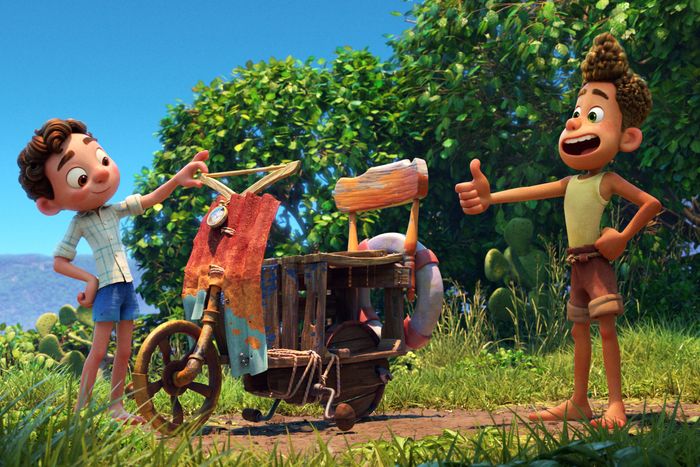
Portorosso, the fictional setting of the new Pixar movie, Luca, is a bright daydream of Italy. Cobblestoned streets wind their way up hills; residents pepper their speech with ejaculations like “Santa Mozzarella!”; and each year the kids compete in a triathlon of swimming, cycling, and pasta eating. The pastoral charm doesn’t stop at the shoreline. Underwater, sea monsters live in a community that’s just as quaint, herding sheeplike fish and cultivating rows of kelp. They keep out of sight of the “land monsters,” who have an alarming habit of hoisting harpoons and decorating their plaza with images of fishermen defeating oceanic menaces. But how could anything dark happen in an animated world so mild?
When Luca (Jacob Tremblay), the movie’s young sea-monster protagonist, first gets yanked out onto the sand by his friend Alberto (Jack Dylan Grazer), the moment thrums only with a sense of undefinable possibility. Alberto looks on, unimpressed, while Luca sputters and gasps and transforms into a human boy as the water dries off his body. “First time?” Alberto asks. “Of course it is!” Luca retorts. “I’m a good kid!”
When Luca — which was directed by Enrico Casarosa (of the short La Luna) and written by Jesse Andrews and Mike Jones — was announced, the internet was quick to call out parallels between this film and Call Me by Your Name. Although no one would expect to get anything like the peach scene in a PG-rated Pixar movie, Luca does seem to deliberately invite comparison with director Luca Guadagnino’s romance, right down to a protagonist who shares his first name. Like Call Me by Your Name, Luca is the story of two boys taking a journey into the intoxicatingly forbidden during a summer in Northern Italy. It also involves a lot of frolicking around in shorts, riding scooters, and expressing jealousy when one of the pair starts spending more time with Giulia (Emma Berman), the spunky local girl Alberto and Luca join up with for the big race. That those boys happen to be sea monsters who revert to their scaly form whenever they touch liquid doesn’t discount the undercurrents.
Luca is not, ultimately, a love story. But it is a story that’s explicitly about otherness and self-discovery. The symbolism lends itself to interpretations of queerness, or as an allegory of assimilation. Alberto and Luca run away to live in Portorosso after Luca’s loving but overprotective parents (Maya Rudolph and Jim Gaffigan) attempt to send him to live with his deep-sea-dwelling Uncle Ugo (Sacha Baron Cohen). The kids have to pass in a community they expect would react with hostility if they were ever perceived as they wholly are. Alberto harbors a fantasy of perpetual escape in which he and Luca will use the prize money from the race to buy a Vespa and go on a never-ending road trip, while Luca, to Alberto’s dismay, starts to wonder if there’s a place where he can learn from and live among the humans — even though there are some, like town bully Ercole Visconti (Saverio Raimondo), who wear their intolerance proudly. “What happens when she sees you? When anyone sees you?” Alberto demands when Luca starts talking about following Giulia to school.
Luca is so intent on meaning something that it only ever halfway inhabits the delightfully colorful world it lays out. We never get a deeper understanding of the history between the sea monsters and the humans beyond some hints that there has been far more interaction than Luca was raised to believe. We never find out why Luca’s mother thinks the world is so dangerous; the narrative just needs her to be paranoid, and so she is. Alberto’s wayward dad remains an offscreen squiggle, a means of bolstering the surrogate-parent relationship Alberto begins to develop with Giulia’s father, a stern but kind fisherman whose bushy eyebrows are identical to his bushy mustache. Luca falls in love with astronomy after Giulia shows him the heavens through a telescope, but his burgeoning desire to study exists in contrast to nothing in particular, because there’s no sense of what future would have been available to him had he stayed underwater.
One of the side effects of children’s films becoming more progressive, aware, and careful is that they can lose some of the dimensionality they had before, when they were awash with subtext that didn’t always feel coherent or intended. Luca collects artifacts from the world above — much like a certain Disney mermaid with whom he shares a corporate umbrella — while never encountering anyone as defiantly memorable as Ursula, a villain based on the drag queen Divine. The film would rather evoke Guadagnino and Hayao Miyazaki, especially the latter’s Porco Rosso; the 1992 movie is an obvious touch point. But Luca doesn’t have the lived-in texture of a Studio Ghibli production, either, that palpable sense of a universe extending beyond each animated frame. What it does have are some groovy Italian pop songs and a setting as pleasant as a summer afternoon. The light glimmers off the surface of the ocean without any worry of going too deep.


